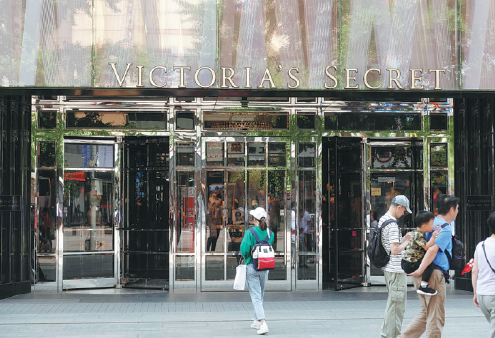US lingerie retailer to open more stores, launch exclusive products in China
Victoria's Secret, the United States-based lingerie retailer, is opening more stores and launching exclusive swimwear collections in China this year, with an eye on further expanding its presence in the country.
Last month, the company launched new swimwear collections via online platforms and at select brick-and-mortar stores globally. In China, the swimwear will be sold at three stores in Beijing, Shanghai and Guangzhou, Guangdong province, in addition to its official online store, according to the company.
The swimsuit series will include bikinis and one-pieces, and are priced between 198 yuan ($30) and 798 yuan. In 2019, the company started reselling its swimsuits collections, after suspending sales of the products since 2016, as it fell short of inclusivity standards since the available sizes ended at "L" or large.
This year, Victoria's Secret has launched its latest adjusted female swimwear products with sizes ranging from XS to XL and in different chest measurements, as the company aims to cater to more consumers with different body shapes.
Victoria's Secret will permanently close a group of stores in North America this year. But it will continue to increase its investments in China.
The company will open new outlets in the country that include flagship stores selling several types of products such as lingerie, sleepwear, other accessories and swimwear.
Since late 2019, Victoria's Secret started a new brand strategy that featured more styles. In early 2020, the brand launched its lingerie advertisement images with plus-size models, at a time when the company lost some of its market share to more size-inclusive brands.
"The swimsuit products of Victoria's Secret have a certain group of consumers and enjoy a remarkable influence. The new collection introduced in China has made some adjustments based on the purchasing demand and body shapes of Chinese women," said Li Jincan, an analyst at the LeadLeo Research Institute, a market research provider.
"The new series is expected to get a good market response in China. For Victoria's Secret, a brand that mainly features sexy images, swimsuits play an important role in helping the brand to strengthen its diversified image and generate more profits," she said.
With more consumers pursuing healthy body shapes and advocating various looks, the impact of sexy marketing is gradually weakening globally, said Li from LeadLeo.
"In China, more local brands with different swimwear styles catering to a wide range of sizes have constantly emerged, and they are suitable for diversified groups of consumers. While the main consumer group of Victoria's Secret is relatively single, we will wait and see its performance in China."
In late February, Victoria's Secret's parent company L Brands reported fourth-quarter earnings for the financial year 2020. During the fourth quarter that ended on Jan 30, L Brands achieved sales revenue of $4.82 billion and net income of $860.3 million, compared with a loss of $192.3 million a year earlier.
During the same period, Victoria's Secret same-store sales dropped 3 percent year-on-year, while the decline was significantly narrower on a quarterly basis, according to its earnings report.
Globally, the scale of the swimwear market is about half the lingerie market. In 2019, swimwear and sports goods sales across the world stood at $47.3 billion, and a large part of the revenue came from the United States, according to LeadLeo.
Between 2019 and 2023, the compound annual growth rate of the swimwear and sports goods market is expected to reach 2.4 percent. In 2019, sales revenue of swimwear in the US reached $47 million, and sales in the United Kingdom reached $2.1 million, data from LeadLeo found.
On another front, more environment-friendly swimwear products have emerged in the market. Swimsuits are designed to resist sunlight, chlorine and salt water, and the material is thus more difficult to be biodegraded and recycled.
It has increased the burden of waste disposal in the swimsuit industry, and more brands have recently introduced swimsuits made from materials that have a limited impact on the environment globally.
In June last year, Japanese multinational chemical company Asahi Kasei Corp launched a sustainable swimwear brand, which is made from fully regenerated fiber.















